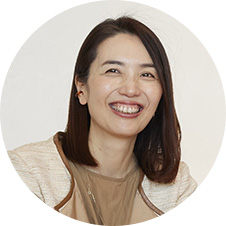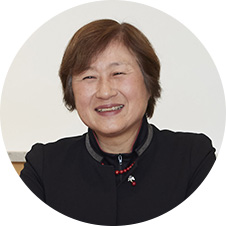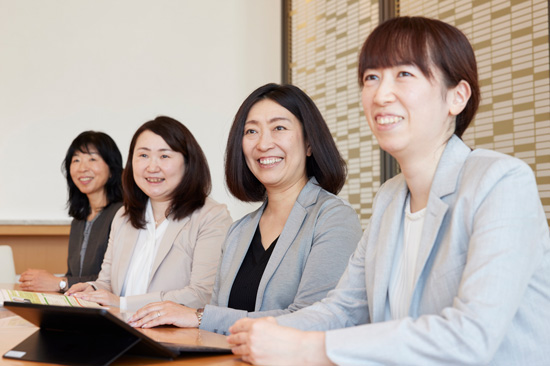
Round-table Discussion with Female Outside Directors >Creating a corporate culture in which women can play even more active roles
Fostering a corporate culture in which diverse human resources can play an active role is essential to enhancing the Bank’s corporate value. JAPAN POST BANK has set the goal of raising the percentage of women in managerial positions to 20% by April 2026 and is working to create an environment in which women can exercise leadership.
Two female outside directors and female managers of the Bank recently gathered to have a roundtable discussion. Topics discussed ranged from how to approach work to the challenges the Bank faces in cultivating female leaders and the impact this will have on its management.

Female Outside Directors

Risa Aihara
A system that recognizes people who embrace challenges will drive further change.

Reiko Amano
Raising children has led to improved management skills.
Participants
Roko Izawa・Minako Ichimura・Makiko Oka・Keiko Kurasawa・Sachiyo Goto・Mikiko Kobayashi・
Aki Sakamoto・Mamiko Nishimura・Kunie Hamaguchi・Kaoru Hira
Yuko Yoshida, Executive Officer
Mikako Saito, General Manager of Diversity and Inclusion Department
THEME 1Changing Consciousness with Position Upgrade
Aihara :
When I went from being an employee to being a business owner, I experienced three major changes. The first change was my resolve as a business owner. Not only were all final decisions left up to me as the owner, I was also responsible for all of the various trouble that occurred in the company. I had to be ready to accept that. The second was a change in the way I worked. There were times as an employee when I would take time off work if I wasn’t feeling well. But now, as the owner, it’s more difficult to take time off. I always have to stay on top of my health to maintain an even keel.
The third change was the realization that I’m not perfect. Management involves numerous aspects, including finance, human resources, and sales. It’s hard for one person to be versed in all of these things. I have become aware of the importance of being flexible in delegating to others the things I can’t do, and of building a cooperative framework.
Ichimura :
My goal is to work in a consistently positive manner, but it can be really hard to stay motivated. What do you see as being important in maintaining and enhancing your personal motivation?
Amano :
The important thing is to make a genuine effort to understand the task at hand, whatever job you may have been given. When I was working for a general contractor, I was assigned to a field in which I had little experience. Besides me it was an all-male department, and I was clueless about what to do. I struggled every day to understand all the ins and outs of the job, one by one. Seeing how hard I was trying, my male colleagues gradually began to lend a hand, as they came to recognize my abilities and values. If you really put yourself into your work and make an effort, someone will always appreciate it. That in itself can build your motivation.
THEME 2Work-life harmony
Aihara :
My motto is "work-life harmony"—my sense is that a healthy emotional balance is important. So, I try to have a cheerful attitude about work, regardless of the situation. In any company, if the top management is disgruntled, the mood throughout the company will be gloomy. Of course there are times when things don’t go well at work and I get down. In moments like those, I make it a rule to put such feelings behind me on the train ride home, and move on. Since a lot of women tend to be serious, I think the ability to re-set one’s mood is really crucial.
Hira :
I was working shorter hours while raising my child, and found maintaining the right work-life balance to be a challenge. I was concentrating on ways I could manage my work more efficiently. But the really helpful advice I got was that you achieve the right balance not just by thinking about the work, but by re-setting your emotions and working with a positive attitude.
Amano :
When I was raising children, I also had to come up with ways to more efficiently allocate my time. It was hard to maintain the right work-life balance, but I’m also convinced that my management skills improved dramatically through this experience. It honed my skills in assessing the relative importance of work, making firm decisions about what to do and what not to do, and getting results. I don’t think I’m alone—employees who have gone through the experience of raising children typically show a marked improvement in their management skills.

THEME 3Creating a framework that allows women to excel
Aihara :
JAPAN POST BANK is working to raise the percentage of women in managerial positions to 20%. My sense is the fact that the Bank has not achieved this goal is more of a systematic problem than a problem of individual ability. That means we also have to reform the framework, such as adding the promotion rate of female managers to the evaluation criteria for managers. On a separate note, even when they are more than capable, many women tend to lack confidence and assume that they can’t become managers. To encourage such employees, I think it is vital in encouraging the promotion of women to create a system that recognizes people who embrace challenges without fear of failure.
Amano :
I concur with the need to change the evaluation system. I am confident that if supervisors properly evaluate and encourage their female staff, they will be able to maximize their strengths.
I would also like our female employees to believe in themselves and be confident. Take on new challenges. If it doesn’t work out, just honestly admit failure and use that experience to do better the next time. Make it a habit to say everything you want to say clearly and with confidence. And to firmly state your conclusions. Doing so will be more convincing to your listeners.
Kurasawa :
I think a lot of men have confidence, maybe because they are raised from a young age to be tough. In contrast, women tend to not put themselves forward when it comes to promotions. I think it is crucial for female employees to be confident. On the other hand, as someone who evaluates employees, I also want to train my eyes to properly ascertain the capabilities of each individual.
Nishimura :
Generally speaking, men have a strong sense of drive to aim higher, so they make the effort to acquire the skills needed to get there. This feeds into a tendency to assign men to managerial roles. But there seems to be more caution about assigning women to such roles, over concerns that it will impose a burden on them. As a manager, I want to eliminate such gender bias as far as possible and encourage diversity.
Goto :
I think further increasing the number of female managers will better enable us to incorporate diversity and broaden the range of opinions. I want to continue drawing on my experience, for instance in helping the Bank create a work environment that makes it easier for female employees who are raising children to be involved in sales. As the number of female managers with decision-making authority grows, my hope is that the pace of change will increase.

THEME 4Harnessing greater community vitality in work
Amano :
When I worked for a general contractor, I was afforded numerous opportunities to participate in various forums, including outside committees. This exposed me to values that were completely different from those of the construction industry. Above all, I was able to significantly expand my personal network, which later served as a source of growth. That’s why I want women in the Bank to have more contact with people in other fields. Learning about the outside world will broaden your thinking and spark new ideas, and give you a sense of how the world will change in the future.
Aihara :
People can only grow by taking on challenges. This is where work colleagues are really important. Vertical organizations are fragile and can become dysfunctional if relationships between superiors and subordinates break down. Aside from that, I think it would help if the Bank took steps to build cross-departmental communities where supportive diagonal and horizontal relationships can be formed.
Furthermore, I believe activities to share information with people outside the Bank, like forming a team to promote women’s participation in the workforce in collaboration with other banks, would be a major benefit for both individual employees and JAPAN POST BANK.
Hamaguchi :
I recently participated in a cross-departmental one-on-one meeting that started up within the Bank, from which I personally learned a great deal. By listening to members of other departments, I could gain new knowledge and see the relationships between departments. I was also delighted to learn that my remarks were a source of new insights. I would like to make the significance of such initiatives more widely known within the Bank and further promote efforts to expand internal networks.
Oka :
My bosses have always been men, which makes it hard to imagine what it’s like to be a female manager. But today, I’ve been hearing from many managers who are role models. This is a key opportunity to change my outlook. I want to leave behind my previous way of thinking and not hesitate to challenge myself to do what I believe I should do.
Sakamoto :
I joined JAPAN POST BANK as a career change, so I was unable to feel a connection without my peers. Even in my current work, there’s a lot that could be done more efficiently if I had lateral connections within the Bank. Going forward, I hope to continue deepening my knowledge and further strengthen internal collaboration through these types of opportunities.
Izawa :
I joined JAPAN POST BANK from a foreign financial services institution. At the time, I felt that the Bank still had a somewhat conservative culture typical of Japanese companies, and that there was an atmosphere that made people hesitant to propose new initiatives or reforms.
Also, to recruit the young talent that will take responsibility for the future growth of the Bank, with the help of everyone here, I would like to gradually reform the organization, so that our valuable human capital, people who are eager to learn and want to take on challenges, can take the first step forward.
Kobayashi :
Sensing a bright future for JAPAN POST BANK after its privatization, I was among the first group of employees to join the Bank after privatization. I have always wanted to take in everything there is to learn, and have approached my work with gusto and without hesitation. However, when I look at the female employees around me, I think there are still people who remain hesitant. We should continue to make improvements, solving every issue we can through changes to the framework. I would like to further expand communities like the one here today, creating an environment in which women can play an increasingly active role.
Yoshida :
My impression is that female managers are adept at supporting employee growth and cultivating human resources in line with the individual characteristics of employees. While there are still many male managers in the workplace, I believe that if we can increase the number of female managers with decision-making authority in the future, our human resources strategy will start to take off.

THEME 5Bringing women’s perspectives into service improvement and innovation
Aihara :
In order to successfully incorporate rapidly evolving digital technologies into its services, create new businesses, and achieve transformation going forward, rather than trying to go it alone, to collaborate with IT companies and other partners for the Bank. Here, I believe female employees who can think from the customer’s perspective and communicate well with outside parties will be able to carve out a broader scope for their activities.
Also, although it may still be hard for women to become the head of existing departments, I think there will be opportunities in new business areas. So, I would like to see women continuing to embrace challenges and aim for more senior positions.
Amano :
There seems to be a tendency for JAPAN POST BANK to stay closed off in its own financial shell. To break out of this shell and develop a wider range of services that go beyond conventional banking, I believe the sensibilities of women, who can quickly grasp the needs of consumers, will become increasingly critical. A former boss once told me, "Whatever position you’re in, the really interesting thing is to have the power to make decisions." My hope is that everyone will take on the challenge of aspiring to positions with decision-making authority.
Saito :
It was very meaningful to hear everyone’s open and candid opinions. Our two outside directors gave us strong messages of support, drawing from a variety of personal experiences. I hope we can put what we take away from today to good use, and work together going forward to create various communities and take other steps to build up the Bank’s culture. If we put our heads together, I think we can have a positive impact on management and the Bank as a whole, paving the way for the Bank’s transformation.
I appreciate your time today.